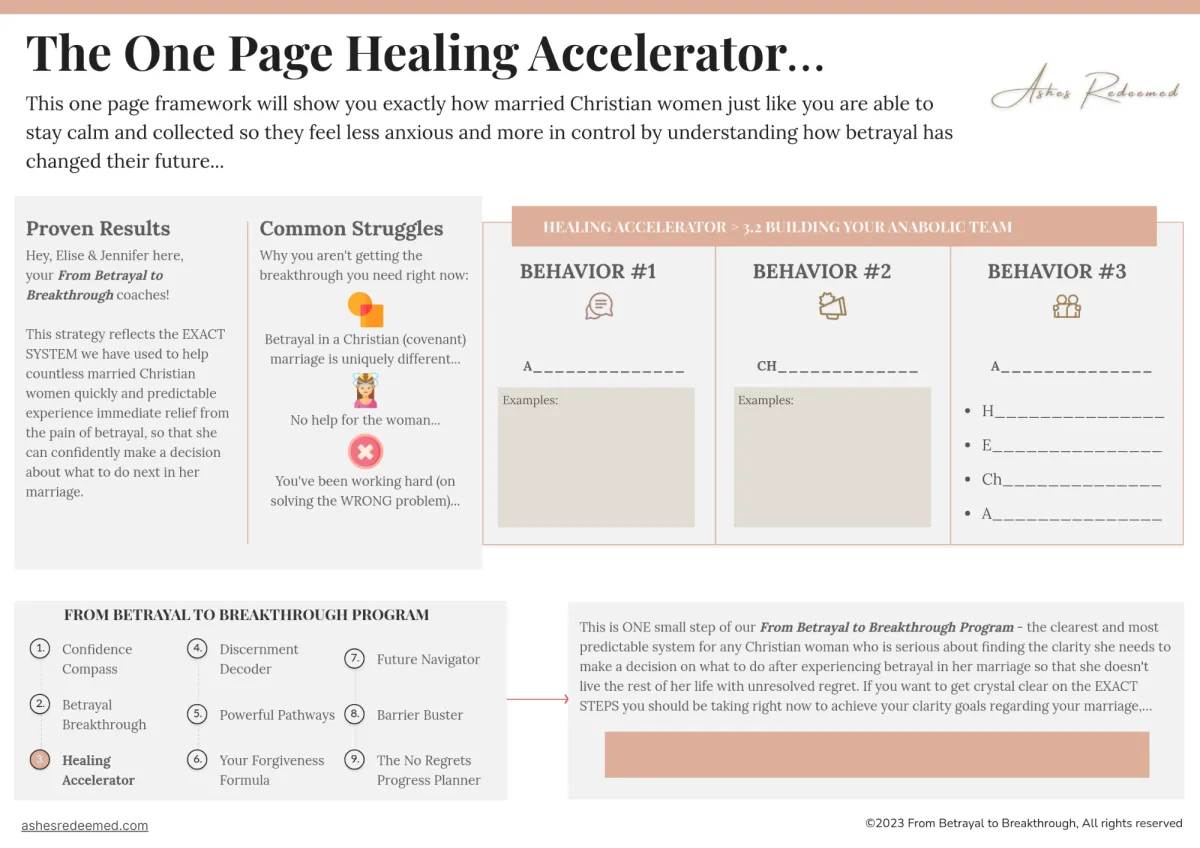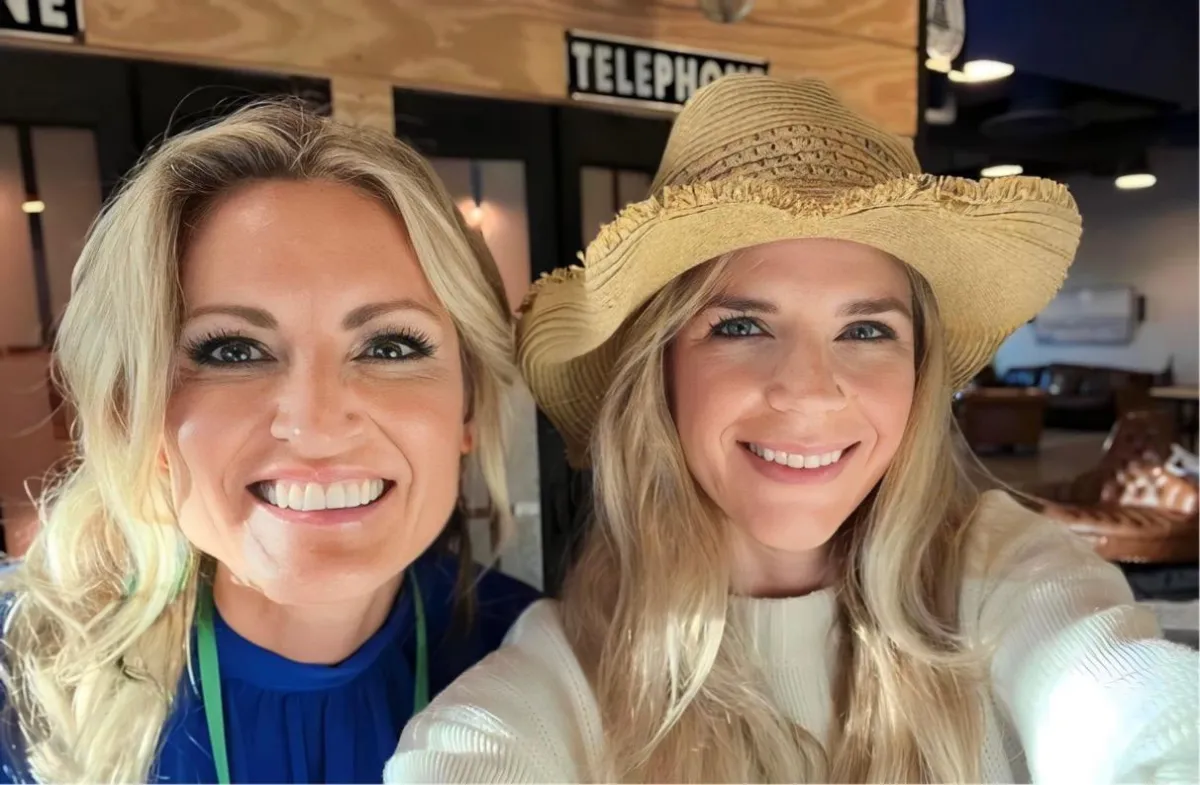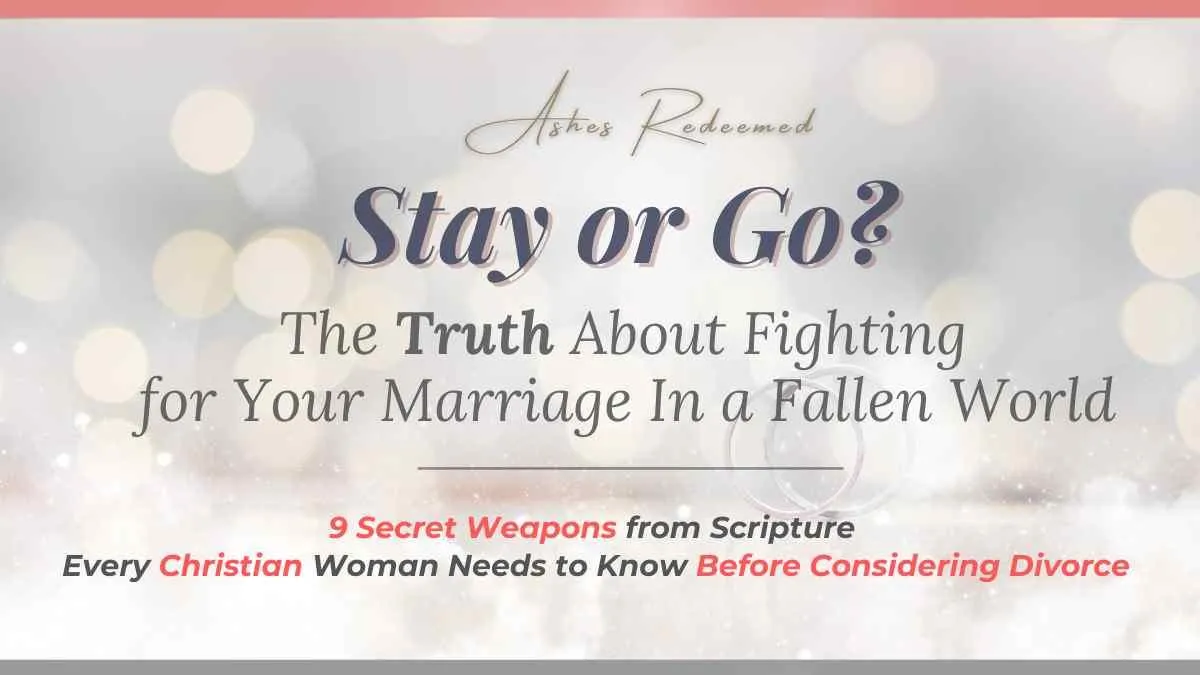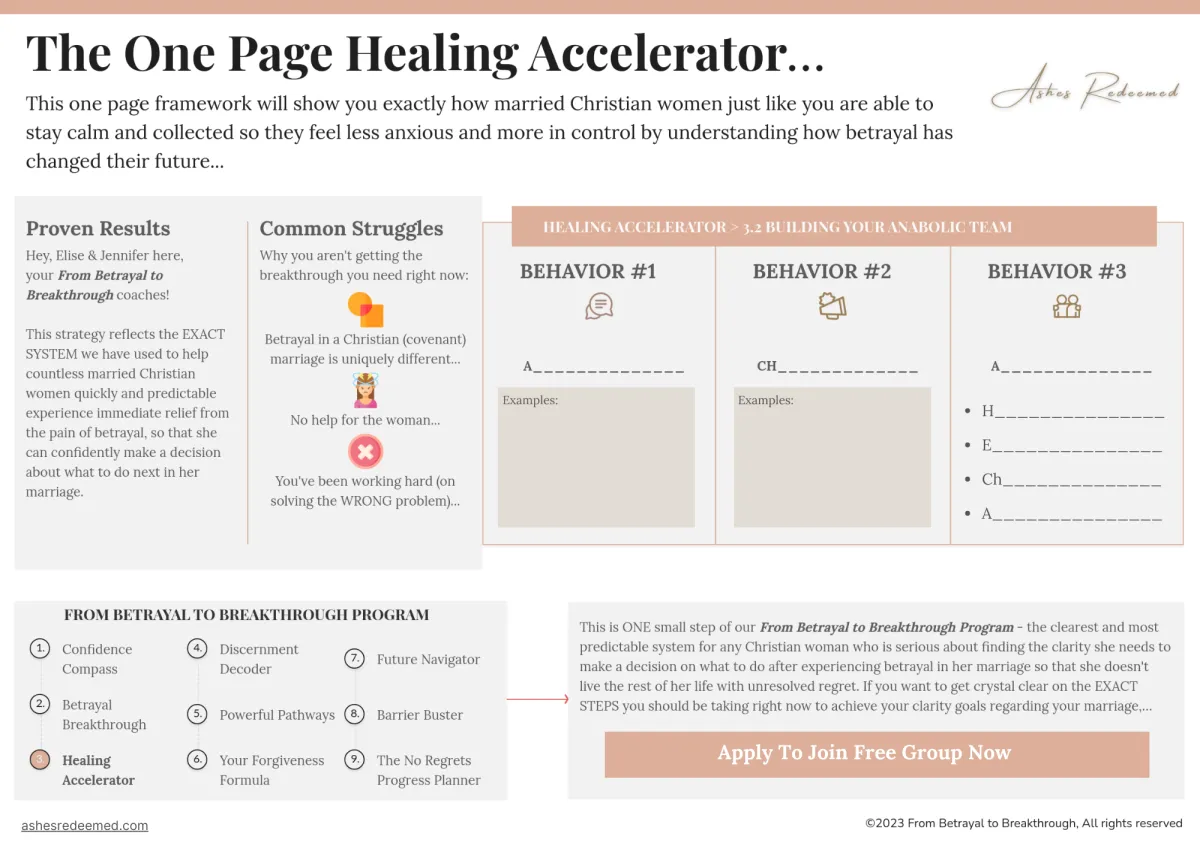
Marriage Coaching for Christian Women
Coming Soon!
Free Resource Library
Scroll down to see:
The Ashes Redeemed Blog
Bi-Monthly Faith & Fellowship Zoom Calls
On-Demand Trainings
Free Resource Library
Scroll down to see:
The Ashes Redeemed Blog
Bi-Monthly Faith & Fellowship Zoom Calls
On-Demand Trainings
The Ashes Redeemed Blog

Ashes Redeemed Newsletter | March 2025
In This Issue:
Welcome to March!
Monthly Devotional: The Benefits of Boundaries
Fidelity Focus: More on Boundaries After Betrayal: Misconception #1
Ask Ashes Redeemed: “What if my boundaries aren’t working?”
Editor's Pick: The R.E.F.R.E.S.H. Betrayal Assessment
Upcoming Events in March & Beyond
March: Faith & Fellowship Calls
April: (New!) 30-Day Prayer Challenge
May/June: (New!) 8-Week Bible Study
Welcome to March!
by Jennifer Kwiatkowski

Many of us have read or heard of the “Parable of the Seeds” spoken by Jesus in the book of Mathew, Chapter 13:1-23. This parable talks about a farmer who is scattering seeds, and while he does so, some of the seeds fall upon four different types of soil. Jesus explains that within the parable, the farmer represents God, the seeds represent the Word, and the soil represents a person’s heart condition.
I have read this passage many times; however, reading this parable this morning was quite different. Since the Ashes Redeemed’s topic of the month is boundaries, I challenged myself to read the passage contemplating how this parable may relate to setting boundaries within ourselves and our relationships. Here is what I discovered:
Where were the FIRST seeds sown? These seeds were sown along a path. The birds must have been carefully watching the farmer do his work because as soon as the seeds fell to the ground, they stooped in to snatch them up and eat them.
How does this circumstance relate to boundary setting? The Bible is very clear about the reality of an enemy who prowls around, waiting for a way to devour our faith and endurance. When individuals encounter the Word of God but assume it is irrelevant or lack interest in learning more about its power and authority, Satan gladly comes to swoop up the Word, as it has “no use” for those who disregard it.
How can we prevent this from happening to us? Aloofness to the spiritual realm makes us an easy target for the enemy. Burying our heads, pretending that the devil doesn’t know who we are or that he doesn’t seek to harm us, doesn’t negate scripture on the subject. How we “feel” about something doesn’t change its reality. Knowing that an enemy of God wants to prevent us from hearing the Word motivates us to set a boundary for ourselves that ensures we will “seek first the kingdom of God” before anything else. Understanding, studying, and meditating on the Word must be our top priority, equipping us with spiritual armor and allowing us to show up as our best selves in our relationships.
……..
Where were the SECOND seeds sown? These seeds were sown along the rocky places. The soil was shallow, and the sprouts sprung up quickly. However, when the challenging weather elements beat on the sprouts, they withered because the seeds had neglected to grow roots.
How does this relate to boundary setting? People will often receive the good news of Jesus’s grace with joy and excitement, thinking that this will be a great “add on” to their life, and with the “Jesus upgrade”, life will become much easier. However, when these same people encounter hardship and challenges, they are astonished that their “new Jesus” doesn’t remove them from strife. Because they did not create boundaries around how they would learn about Jesus and who they would fellowship with to grow their faith and understand what it is like to be a Christ follower, their new rootless sprout disintegrates.
How can we prevent this from happening to us? The gift of salvation is the greatest gift we can ever receive, and the gifted grace and supernatural power of the Holy Spirit in our lives are worth any challenge and strife we may experience because we are a Christ follower. However, we must remind ourselves that there is a cost to becoming a child of God. Being a Christian is not a passive hobby, it is a passionate pursuit. God says when we seek Him, we will find Him (Matthew 7:7-8).
This truth means we must consistently seek to deepen our intimacy with Him through knowledge and understanding. Setting boundaries regarding how and who we will spend our time with will shape our environment and available time to “going deeper” into the faith. If we engage in activities where the soil is shallow or even toxic, we jeopardize the strength of our spiritual roots. Identifying this risk in our lives eventually requires changing our environment, activities, and availability for relationships that are degrading to our spiritual health.
……..
Where are the THIRD seeds sown? The third seeds are sown among the thorns, and when they grow up amongst the seedlings, the fellow thorns choke the plants that were budding from the seeds.
How does this relate to boundary setting? The enemy isn’t creative; he is a counterfeiter. When God creates an object, attitude, or activity and calls it good, you will find the enemy working hard to make a counterpart of that creation. The enemy’s counterfeit is specially designed to slyly draw you away from the goodness of God - take money, for instance. Money can be used to spread the kingdom through generosity and wisdom, and it can be used to foster sin through funding selfish, sinful, and evil pursuits. When we fail to understand that Satan doesn’t show up with horns and a pitchfork but rather with similar counterfeit options to God’s ways, our faith can slowly be choked out by opinions and temptations that are “almost true” to God’s Word (which makes the opinions 100% false).
How can we prevent this from happening to us? Fence sitting in our faith can become the norm when our perspective of truth becomes more gray than black and white. Because our Father loves us, which is Biblically proven to be true all over scripture, He will allow or even initiate events to occur in our lives that require us to jump off the middle of the fence, forcing us to decide on which side we will fall (Joshua 24:15).
When we establish in our mind that the truth of the Word is nonnegotiable, whether we feel it or not, the fence that we are tempted to sit on becomes more uncomfortable. Informing others, through clear boundaries, of the truth that we stand on can be uncomfortable and conflictive (Luke 12:51-53), however, in the end, we will be preserved by the goodness of God because His Word is our protector and teacher as we mature in our faith and witness.
……..
Where are the FOURTH seeds sown? The fourth seeds fell on good soil. The healthy, receptive soil received the seeds with gratitude and intended to multiply its fruit by 100-fold.
How does this relate to boundary setting? When we anticipate an important upcoming event, we prepare for it, often excitedly. The same is true when we plan to spend time with someone we love and cherish. In this case, we prepare ourselves physically and mentally to welcome this person with joy. When we believe Jesus’s Word is written directly to us and is applicable to our lives, we approach it prepared to listen intently, and eagerly apply what we learn in scripture to our circumstances.
How can we prevent this from happening to us? There is a difference between reading the Word with attention, presence, and anticipation and reading to “check a box”. Developing a habit of reading the Bible daily, while being receptive and still before the the Holy Spirit (ready for Him to show you what His Words mean specifically for you) can change your life in a transformative way.
There is no “magic formula” for hearing from God because the way He uniquely speaks to you is His choice, but there is a surefire condition of the heart that will cause your ears and eyes to be opened and ready when He does speak. Showing others that your time with God is precious by being firm about your boundaries regarding not being disturbed during your time with the Lord can speak volumes both to your loved ones and to God!
Just as we teach at Ashes Redeemed, boundaries are set to protect and prioritize what is most important to us, and boundary setting begins with setting them for and on ourselves first!
The Benefits of Boundaries
Monthly Devotional & Journal Prompt | By Jennifer Kwiatkowski, CPC, ELI-MP, CWDS

Let’s be honest. Healing doesn't just happen on its own. You've probably heard the saying, "Time heals all wounds," but that's not entirely true.
Taking care of your spiritual, emotional, and mental wellbeing needs an intentional approach. Healing from a wound in one of these areas requires taking a look at what has hurt you, garnering a healthy perspective about it (often with support) and deciding what you have learned and how you can apply that to your future.
Part of that application includes engaging with your surroundings in a new way. For example, say you have been devalued in a relationship and your self-confidence has taken a hit.
(Watch the full March Devotional in The ARC!)
Showing up differently, a result of working through healing, means you create boundaries in that relationship where you stand in your fresh knowledge that you have immense value no matter what anyone else says or does to contradict that. If you want different results in your relationships, you can't keep doing the same things and interacting in the same way. It just doesn’t work. In fact, it defies logic. It's like driving the same route every day and expecting one day to end up somewhere new.
The same goes for changing our thoughts. To experience new interactions with others, a change in our thinking is necessary because thoughts that are aligned with God’s Word are what fuel the ability to set appropriate boundaries in relationships.
God's intention for marriage always included protection for our spirit, mind, emotions, and body. But in our imperfect world, these ideals aren't always present. Avoiding boundary-setting in marriages might be part of the problem. Boundaries remind us to uphold truth, practice self-control, and respect each person's worth. While not an easy topic for many (especially if standing up for yourself feels foreign), boundaries are vital because they protect us emotionally and can restore relationships when another’s behavior becomes harmful. They bring clarity to communication, reduce misunderstandings and unnecessary pain, and often bring about positive change and healing.
1 Timothy Chapter 4 is a peek into a letter from Paul to Timothy, guiding him as a young preacher. Paul urges Timothy to recognize his own worth and remain steadfast in his faith.
He advised:
“Don’t let anyone look down on you because you are young, but set an example for the believers in speech, in conduct, in love, in faith, and in purity.”
Paul saw that Timothy might understandably struggle to assert his value among false teachers who viewed him as inexperienced. Although Timothy had time to prepare, facing religious leaders wasn't easy. Paul encouraged him to stay firm in Christ-centered behavior for those observing and also for his own wellbeing.
Because boundaries are a skill taught and demonstrated by the Lord, let's talk about a couple of common misunderstandings about boundaries that might get in the way of us applying them.
Misconception #1: Setting boundaries means you are trying to make someone do something.
This couldn't be more wrong because you can't permanently control someone else's actions. Boundaries aren't about anger or revenge; they are about ensuring a healthy relational environment. Since true change only happens through God’s work in one's heart rather than external demands, accepting that you can't permanently change another’s behavior is empowering. Here is what you can control: setting boundaries for YOUR benefit and controlling what you allow into your life for your own emotional, spiritual, and physical health. Boundaries are a form of self-respect, as we are made in God's image. Jesus said to love your neighbor as yourself, meaning self-love is crucial, too. Setting boundaries is an act of self-care, not control.
Misconception #2: Setting boundaries with your husband means you're being unsubmissive.
As Christian women, we strive to be obedient to God's call for submission, yet confusion can arise when it comes to applying this call to our lives. Submission starts in our relationship with God. It means putting God first above any other priority or opinion. If a husband's behavior isn't aligned with God’s will, submissiveness doesn’t just look the other way regarding his behavior. Submission in marriage doesn’t require saying yes to every request, especially when God’s plans are overlooked. Marriage is about developing a fuller identity together, which can only be done through accountability and watching for each other’s blind spots. It's where clarity, organization, and unity are fostered through mutual roles designed by God.
Effectively setting boundaries requires skill and practice. It starts with understanding our security and role through Christ’s demonstration and instruction. Self-worth in Christ allows a woman to protect both herself and her marriage. Boundaries create an atmosphere where mutual respect and love guide behavior.
Remember these three things about boundaries:
Seek God’s Wisdom: Pray for guidance. Faith may tempt us to think salvation alone shields us from pain, but boundaries are essential for wellness in every relationship. God answers prayers and helps us tackle difficult choices.
Remember Who Boundaries Are For: They're not for controlling others. They establish a healthy environment, define responsibilities, and promote wellness for yourself.
Expect a Response: Introducing boundaries often meets resistance, especially from those unfamiliar with accountability. Staying firm is vital, as discomfort sometimes fosters growth, pushing relationships toward healing.
* Important note: Boundaries in abusive situations can be a much more complicated subject. It's best to consult professionals if safety is at risk. If you suspect abuse, reach out for immediate help from a therapist or the National Domestic Violence Hotline.
Journal Prompt: Recall a difficult time with someone you care about. Did you establish boundaries to protect your respect during the conflict? If you did, how did you enforce them? If not, what held you back from setting personal boundaries for yourself and the relationship?
Share your answers with us here, in The ARC!
With Love,
Jennifer
More on Boundaries After Betrayal: Misconception #1
Boundaries are set “against” someone else to “keep them in line”
Fidelity Focus | by Elise Park, PCC, CWDS, ELI-MP
The Fidelity Focus article is our take on articles, books, podcasts, and other widely available resources that a woman may encounter as she equips herself in protecting her marriage, her faith and her family.

If you've faced betrayal, it's easy to feel lost and unsure of what steps to take next. You might have heard that setting boundaries is important, but maybe you're wondering what that's all about. Let's clear up a common misconception.
Boundaries Aren’t About Control
You might think boundaries are meant to control or "fix" someone else, like your husband. But the truth is, no one can change someone else. True change comes from within, and for Christians, such change is inspired by faith and guided by God’s work in our hearts.
Finding Ground in Faith
When a relationship is strained from something as severe as betrayal, we’re filled with confusion and hurt. While it's natural to want a quick solution, remember that you are not responsible for your husband's actions. Where do we see this in Scripture? First, God held Adam accountable for his sin even though he tried to blame it on Eve (Genesis 3:12). We read about the prophet Hosea, and his commitment and devotion to Gomer, who continued in her life as a prostitute even after their marriage (the book of Hosea). As our sanctification processes are at work to make us more like Christ, we see the steadfastness of God reflected in 2 Timothy 2:13, which states that, “If I am faithless, He remains faithful.” Everyone is accountable for their own choices.
Setting Boundaries for You
Think of boundaries as putting on your own oxygen mask first. They’re for your safety—physically, emotionally, and spiritually. When you set them, you're choosing to protect your well-being. By stepping away from negative situations, you can see who is truly responsible for their actions (hint: it's not always you).
The Power of Self-control
Boundaries help you respond in your relationship from a place of strength. They aren't barriers set against someone else, but rather are about caring for yourself. Boundaries reflect the fruit of the Spirit, especially self-control, and allow you to manage your resources—mental, emotional, and physical.
Love Yourself, Like God Loves You
Remember Jesus’ words about loving your neighbor as yourself? That means loving yourself is important, too. Not in an over-inflated, self-worshipful kind of way, but in a way that honors your inherent and God-given value. By setting boundaries, you're making choices grounded in God’s love. God's grace respects our free will, showing us how boundaries can be life-giving.
A Godly Model
God sets boundaries, too. He makes clear what He will and will not accept. This isn’t about control but about love and respect for free will. We choose to follow or not, and God honors that choice.
Consequences Are Real
Just as sin has consequences, setting boundaries helps us deal with the impact of others' actions on our lives. It's not about punishment but creating a space for everyone to thrive within God’s design.
Remember, you are supported and loved on this journey. Boundaries are a way to live more authentically and securely in the life God wants for you. We invite you to come to one of our two monthly Faith & Fellowship Calls inside The ARC (The Ashes Redeemed Community). This is our safe space to be with other women, supporting one another no matter what stage of marriage and/or healing she’s in.
In Love,
Elise
Ask Ashes Redeemed
Ask Ashes Redeemed is our reader's opportunity. to have their anonymously submitted questions answered by our panel of experts.
Have a question for our team? Submit your question here.

“What if my boundaries aren’t working?”
We hear the word “boundary” a lot (even in this newsletter!) If you have tried to set boundaries in the past that don’t seem to work, don’t get discouraged. You may be falling into a common trap of thinking something is a boundary when it’s really something else. Before we can get into what it means to set a boundary, let’s discuss what a boundary is not.
A boundary is not a request, nor is it an ultimatum.
Boundaries vs. Requests
A request is when you ask someone to do or not do something. It could be like saying, "Would you mind speaking to me more calmly?" But remember, a request is just that—they might say yes, or they might choose not to comply with your request. It's out of our hands, really.
Setting a boundary, on the other hand, is about making clear what you will or won’t tolerate.
For example, "I won’t keep talking with you if you raise your voice." Notice how that shifts the focus to what you'll do? Boundaries are all about your actions and only work if you enforce them.
One way to ease into establishing a boundary is to first make a request and give the other person the chance to understand and respond. Depending on how they respond to you, you may not have to make it all the way to setting a boundary.
However, if it doesn’t work out, and they aren't open to honoring your request, you’ll likely hit a crossroad. Either you accept their choice and stay as is, or it’s time to set a boundary.
You might ask yourself: How open am I willing to be with someone who doesn't seem to listen to me?
Boundaries vs. Ultimatums
Boundaries and ultimatums can seem alike but differ in why we use them. Boundaries help you protect your peace; ultimatums often aim to control others. Let's say that you are one of the millions of women a year who have had the heartbreaking revelation of your husband’s infidelity, and you have noticed that not all of your friends are encouraging you in the same way. Some are supportive of your desire to restore your marriage, but others are telling you that you should divorce him immediately and blaming your Christian faith for skewing your perception of reality.
While you may not have a clear answer as to what you’ll ultimately decide to do, you may choose to set a boundary like this:
"My walk with the Lord is a priority for me. I will not be in close friendships/relationships with people who mock or disparage my faith.”
With this boundary, you're sharing a truth about your needs. In contrast, an ultimatum might sound like telling your friends, "If you don't stop telling me what to do, I’m not going to talk to you anymore!" One demands change while the other sets your own terms. Remember, respecting your own boundaries helps you make choices that honor your faith, protect wellbeing, and respect your needs.
Your Turn
Try creating one of each. Pick a topic that you’re struggling with and write down your own example of a request, an ultimatum, and boundary and see how they feel. Pray over your examples and ask the Lord for discernment in how to apply this information in your situation.
"Can I Really Save My Marriage?"
Editor's Pick
The Editor's Pick allows us to spotlight and share a resource that the Christian woman may find especially helpful in her healing.
A Betrayal Assessment
We know that marriage can be tough, especially when trust has been broken. If you're a Christian woman facing the heartbreak of your husband's unfaithfulness, it can feel like your world is upside down. Whether it's an affair, emotional infidelity, or challenges with pornography, the pain and confusion can feel overwhelming.
You might find yourself wondering whether to stay and work things out or leave to find peace. It's a hard spot to be in, and the fear of regret can make you feel stuck.

But what if you could find a way to regain your confidence? A way to know in your heart what decision aligns with your faith and brings peace? That's where the Betrayal Assessment comes in. It's a tool to help you figure out which stage of healing you’re currently in.
Here's why it's important: Focusing on your spiritual, emotional, and mental health makes you strong. It helps you make confident choices about your marriage that you can feel good about.
Starting your journey toward healing is a decision you can make today. It doesn't have to depend on anyone else. If you're tired of waiting for someone else (i.e. your husband!) to change, wanting to truly honor God in your marriage, and ready to focus on your own healing, we’re here to support you.
The Betrayal Assessment can show you where you are in your healing process and offer a roadmap to find clarity and confidence. You'll also join a community of supportive women who understand what you're going through.
Let's take a look at the stages of healing:
1. Emergency Room Phase:
Right after discovering your husband's betrayal, you may find yourself in shock. It’s an emotional whirlwind—denial, anger, fear, and sadness can feel all-consuming. You may be in survival mode, unsure of what comes next. This stage can last weeks or months, especially if your husband isn't taking responsibility for his actions.
2. Waiting Room Phase:
Here, you're waiting to see if things will change. Your husband might be making promises and you're watching to see if he follows through. This time can feel uncertain, as you hope for improvements but realize they might not come to pass.
3. Scar Tissue Phase:
With time, you might develop emotional "scar tissue." Even years later, the pain can linger. Life moves on, and you may be holding things together for family, jobs, and other responsibilities, but your heart still remembers the hurt.
If any of this resonates with you, consider taking the Betrayal Assessment. You deserve to find clarity and the peace that aligns with your faith. This could be a turning point for you—a chance to move from uncertainty to peace.

Take The Betrayal Assessment Now
Upcoming Events
March

🗓️ Faith & Fellowship Calls
What are Faith & Fellowship Calls? | Hosted in The ARC
Tuesday, March 4 @ 6PM CT
Thursday, March 20 @ 10AM CT
April
🗓️ 30-Day Prayer Challenge

Her Prayer, His Power: The 30-Day Prayer Journey for Women in the Waiting
Click Here To Learn More!
Feeling lost and alone in the wake of betrayal? Stressing because you’re not sure how to make your marriage work, even though you desperately want it to?
You don't have to go through these trials alone. Her Prayer, His Power is a powerful 30-day challenge to get you out of the dumps with faith-inspired support and community.
100% online: Connect with women across the country who understand your journey.
Private women's care group: Participate within a safe space without social media noise.
Bible-based, Jesus-focused: Strengthen your faith and deepen your relationship with Jesus.
Daily encouragement: Refresh your spirit with God's Word in your unique situation.
Accountability check-ins: Keep consistency with shared praises and prayers.
May/June
🗓️ (New!) 8-Week Bible Study

Treasures Through Trials: Discovering Unexpected Blessings Amidst Betrayal Recovery
Click Here To Learn More!
Understanding your pain is crucial to your faith, healing, and future. Our upcoming Bible study, "Treasures Through Trials: Uncovering Unexpected Blessings Amidst Betrayal Recovery," is designed specifically to help the woman who finds herself preoccupied with the pain of her circumstances.
Instead of settling for distractions, ruminating on the betrayal, and worrying about the "what if's", women who participate in this study will learn how to find the buried treasure on her journey toward healing and restoration
8-Week Bible Study: Intimate and interactive, this study will be a wellspring of encouragement.
Join from Anywhere: Log in from any place via Zoom.
Private Supportive Community: Engage with others in a safe space, away from social media.
Weekly Prayer Time: Share and receive prayers, fostering a comforting environment.
Connect With Others: Fellowship with women at various healing stages.
The Ashes Redeemed Blog

Ashes Redeemed Newsletter | March 2025
In This Issue:
Welcome to March!
Monthly Devotional: The Benefits of Boundaries
Fidelity Focus: More on Boundaries After Betrayal: Misconception #1
Ask Ashes Redeemed: “What if my boundaries aren’t working?”
Editor's Pick: The R.E.F.R.E.S.H. Betrayal Assessment
Upcoming Events in March & Beyond
March: Faith & Fellowship Calls
April: (New!) 30-Day Prayer Challenge
May/June: (New!) 8-Week Bible Study
Welcome to March!
by Jennifer Kwiatkowski

Many of us have read or heard of the “Parable of the Seeds” spoken by Jesus in the book of Mathew, Chapter 13:1-23. This parable talks about a farmer who is scattering seeds, and while he does so, some of the seeds fall upon four different types of soil. Jesus explains that within the parable, the farmer represents God, the seeds represent the Word, and the soil represents a person’s heart condition.
I have read this passage many times; however, reading this parable this morning was quite different. Since the Ashes Redeemed’s topic of the month is boundaries, I challenged myself to read the passage contemplating how this parable may relate to setting boundaries within ourselves and our relationships. Here is what I discovered:
Where were the FIRST seeds sown? These seeds were sown along a path. The birds must have been carefully watching the farmer do his work because as soon as the seeds fell to the ground, they stooped in to snatch them up and eat them.
How does this circumstance relate to boundary setting? The Bible is very clear about the reality of an enemy who prowls around, waiting for a way to devour our faith and endurance. When individuals encounter the Word of God but assume it is irrelevant or lack interest in learning more about its power and authority, Satan gladly comes to swoop up the Word, as it has “no use” for those who disregard it.
How can we prevent this from happening to us? Aloofness to the spiritual realm makes us an easy target for the enemy. Burying our heads, pretending that the devil doesn’t know who we are or that he doesn’t seek to harm us, doesn’t negate scripture on the subject. How we “feel” about something doesn’t change its reality. Knowing that an enemy of God wants to prevent us from hearing the Word motivates us to set a boundary for ourselves that ensures we will “seek first the kingdom of God” before anything else. Understanding, studying, and meditating on the Word must be our top priority, equipping us with spiritual armor and allowing us to show up as our best selves in our relationships.
……..
Where were the SECOND seeds sown? These seeds were sown along the rocky places. The soil was shallow, and the sprouts sprung up quickly. However, when the challenging weather elements beat on the sprouts, they withered because the seeds had neglected to grow roots.
How does this relate to boundary setting? People will often receive the good news of Jesus’s grace with joy and excitement, thinking that this will be a great “add on” to their life, and with the “Jesus upgrade”, life will become much easier. However, when these same people encounter hardship and challenges, they are astonished that their “new Jesus” doesn’t remove them from strife. Because they did not create boundaries around how they would learn about Jesus and who they would fellowship with to grow their faith and understand what it is like to be a Christ follower, their new rootless sprout disintegrates.
How can we prevent this from happening to us? The gift of salvation is the greatest gift we can ever receive, and the gifted grace and supernatural power of the Holy Spirit in our lives are worth any challenge and strife we may experience because we are a Christ follower. However, we must remind ourselves that there is a cost to becoming a child of God. Being a Christian is not a passive hobby, it is a passionate pursuit. God says when we seek Him, we will find Him (Matthew 7:7-8).
This truth means we must consistently seek to deepen our intimacy with Him through knowledge and understanding. Setting boundaries regarding how and who we will spend our time with will shape our environment and available time to “going deeper” into the faith. If we engage in activities where the soil is shallow or even toxic, we jeopardize the strength of our spiritual roots. Identifying this risk in our lives eventually requires changing our environment, activities, and availability for relationships that are degrading to our spiritual health.
……..
Where are the THIRD seeds sown? The third seeds are sown among the thorns, and when they grow up amongst the seedlings, the fellow thorns choke the plants that were budding from the seeds.
How does this relate to boundary setting? The enemy isn’t creative; he is a counterfeiter. When God creates an object, attitude, or activity and calls it good, you will find the enemy working hard to make a counterpart of that creation. The enemy’s counterfeit is specially designed to slyly draw you away from the goodness of God - take money, for instance. Money can be used to spread the kingdom through generosity and wisdom, and it can be used to foster sin through funding selfish, sinful, and evil pursuits. When we fail to understand that Satan doesn’t show up with horns and a pitchfork but rather with similar counterfeit options to God’s ways, our faith can slowly be choked out by opinions and temptations that are “almost true” to God’s Word (which makes the opinions 100% false).
How can we prevent this from happening to us? Fence sitting in our faith can become the norm when our perspective of truth becomes more gray than black and white. Because our Father loves us, which is Biblically proven to be true all over scripture, He will allow or even initiate events to occur in our lives that require us to jump off the middle of the fence, forcing us to decide on which side we will fall (Joshua 24:15).
When we establish in our mind that the truth of the Word is nonnegotiable, whether we feel it or not, the fence that we are tempted to sit on becomes more uncomfortable. Informing others, through clear boundaries, of the truth that we stand on can be uncomfortable and conflictive (Luke 12:51-53), however, in the end, we will be preserved by the goodness of God because His Word is our protector and teacher as we mature in our faith and witness.
……..
Where are the FOURTH seeds sown? The fourth seeds fell on good soil. The healthy, receptive soil received the seeds with gratitude and intended to multiply its fruit by 100-fold.
How does this relate to boundary setting? When we anticipate an important upcoming event, we prepare for it, often excitedly. The same is true when we plan to spend time with someone we love and cherish. In this case, we prepare ourselves physically and mentally to welcome this person with joy. When we believe Jesus’s Word is written directly to us and is applicable to our lives, we approach it prepared to listen intently, and eagerly apply what we learn in scripture to our circumstances.
How can we prevent this from happening to us? There is a difference between reading the Word with attention, presence, and anticipation and reading to “check a box”. Developing a habit of reading the Bible daily, while being receptive and still before the the Holy Spirit (ready for Him to show you what His Words mean specifically for you) can change your life in a transformative way.
There is no “magic formula” for hearing from God because the way He uniquely speaks to you is His choice, but there is a surefire condition of the heart that will cause your ears and eyes to be opened and ready when He does speak. Showing others that your time with God is precious by being firm about your boundaries regarding not being disturbed during your time with the Lord can speak volumes both to your loved ones and to God!
Just as we teach at Ashes Redeemed, boundaries are set to protect and prioritize what is most important to us, and boundary setting begins with setting them for and on ourselves first!
The Benefits of Boundaries
Monthly Devotional & Journal Prompt | By Jennifer Kwiatkowski, CPC, ELI-MP, CWDS

Let’s be honest. Healing doesn't just happen on its own. You've probably heard the saying, "Time heals all wounds," but that's not entirely true.
Taking care of your spiritual, emotional, and mental wellbeing needs an intentional approach. Healing from a wound in one of these areas requires taking a look at what has hurt you, garnering a healthy perspective about it (often with support) and deciding what you have learned and how you can apply that to your future.
Part of that application includes engaging with your surroundings in a new way. For example, say you have been devalued in a relationship and your self-confidence has taken a hit.
(Watch the full March Devotional in The ARC!)
Showing up differently, a result of working through healing, means you create boundaries in that relationship where you stand in your fresh knowledge that you have immense value no matter what anyone else says or does to contradict that. If you want different results in your relationships, you can't keep doing the same things and interacting in the same way. It just doesn’t work. In fact, it defies logic. It's like driving the same route every day and expecting one day to end up somewhere new.
The same goes for changing our thoughts. To experience new interactions with others, a change in our thinking is necessary because thoughts that are aligned with God’s Word are what fuel the ability to set appropriate boundaries in relationships.
God's intention for marriage always included protection for our spirit, mind, emotions, and body. But in our imperfect world, these ideals aren't always present. Avoiding boundary-setting in marriages might be part of the problem. Boundaries remind us to uphold truth, practice self-control, and respect each person's worth. While not an easy topic for many (especially if standing up for yourself feels foreign), boundaries are vital because they protect us emotionally and can restore relationships when another’s behavior becomes harmful. They bring clarity to communication, reduce misunderstandings and unnecessary pain, and often bring about positive change and healing.
1 Timothy Chapter 4 is a peek into a letter from Paul to Timothy, guiding him as a young preacher. Paul urges Timothy to recognize his own worth and remain steadfast in his faith.
He advised:
“Don’t let anyone look down on you because you are young, but set an example for the believers in speech, in conduct, in love, in faith, and in purity.”
Paul saw that Timothy might understandably struggle to assert his value among false teachers who viewed him as inexperienced. Although Timothy had time to prepare, facing religious leaders wasn't easy. Paul encouraged him to stay firm in Christ-centered behavior for those observing and also for his own wellbeing.
Because boundaries are a skill taught and demonstrated by the Lord, let's talk about a couple of common misunderstandings about boundaries that might get in the way of us applying them.
Misconception #1: Setting boundaries means you are trying to make someone do something.
This couldn't be more wrong because you can't permanently control someone else's actions. Boundaries aren't about anger or revenge; they are about ensuring a healthy relational environment. Since true change only happens through God’s work in one's heart rather than external demands, accepting that you can't permanently change another’s behavior is empowering. Here is what you can control: setting boundaries for YOUR benefit and controlling what you allow into your life for your own emotional, spiritual, and physical health. Boundaries are a form of self-respect, as we are made in God's image. Jesus said to love your neighbor as yourself, meaning self-love is crucial, too. Setting boundaries is an act of self-care, not control.
Misconception #2: Setting boundaries with your husband means you're being unsubmissive.
As Christian women, we strive to be obedient to God's call for submission, yet confusion can arise when it comes to applying this call to our lives. Submission starts in our relationship with God. It means putting God first above any other priority or opinion. If a husband's behavior isn't aligned with God’s will, submissiveness doesn’t just look the other way regarding his behavior. Submission in marriage doesn’t require saying yes to every request, especially when God’s plans are overlooked. Marriage is about developing a fuller identity together, which can only be done through accountability and watching for each other’s blind spots. It's where clarity, organization, and unity are fostered through mutual roles designed by God.
Effectively setting boundaries requires skill and practice. It starts with understanding our security and role through Christ’s demonstration and instruction. Self-worth in Christ allows a woman to protect both herself and her marriage. Boundaries create an atmosphere where mutual respect and love guide behavior.
Remember these three things about boundaries:
Seek God’s Wisdom: Pray for guidance. Faith may tempt us to think salvation alone shields us from pain, but boundaries are essential for wellness in every relationship. God answers prayers and helps us tackle difficult choices.
Remember Who Boundaries Are For: They're not for controlling others. They establish a healthy environment, define responsibilities, and promote wellness for yourself.
Expect a Response: Introducing boundaries often meets resistance, especially from those unfamiliar with accountability. Staying firm is vital, as discomfort sometimes fosters growth, pushing relationships toward healing.
* Important note: Boundaries in abusive situations can be a much more complicated subject. It's best to consult professionals if safety is at risk. If you suspect abuse, reach out for immediate help from a therapist or the National Domestic Violence Hotline.
Journal Prompt: Recall a difficult time with someone you care about. Did you establish boundaries to protect your respect during the conflict? If you did, how did you enforce them? If not, what held you back from setting personal boundaries for yourself and the relationship?
Share your answers with us here, in The ARC!
With Love,
Jennifer
More on Boundaries After Betrayal: Misconception #1
Boundaries are set “against” someone else to “keep them in line”
Fidelity Focus | by Elise Park, PCC, CWDS, ELI-MP
The Fidelity Focus article is our take on articles, books, podcasts, and other widely available resources that a woman may encounter as she equips herself in protecting her marriage, her faith and her family.

If you've faced betrayal, it's easy to feel lost and unsure of what steps to take next. You might have heard that setting boundaries is important, but maybe you're wondering what that's all about. Let's clear up a common misconception.
Boundaries Aren’t About Control
You might think boundaries are meant to control or "fix" someone else, like your husband. But the truth is, no one can change someone else. True change comes from within, and for Christians, such change is inspired by faith and guided by God’s work in our hearts.
Finding Ground in Faith
When a relationship is strained from something as severe as betrayal, we’re filled with confusion and hurt. While it's natural to want a quick solution, remember that you are not responsible for your husband's actions. Where do we see this in Scripture? First, God held Adam accountable for his sin even though he tried to blame it on Eve (Genesis 3:12). We read about the prophet Hosea, and his commitment and devotion to Gomer, who continued in her life as a prostitute even after their marriage (the book of Hosea). As our sanctification processes are at work to make us more like Christ, we see the steadfastness of God reflected in 2 Timothy 2:13, which states that, “If I am faithless, He remains faithful.” Everyone is accountable for their own choices.
Setting Boundaries for You
Think of boundaries as putting on your own oxygen mask first. They’re for your safety—physically, emotionally, and spiritually. When you set them, you're choosing to protect your well-being. By stepping away from negative situations, you can see who is truly responsible for their actions (hint: it's not always you).
The Power of Self-control
Boundaries help you respond in your relationship from a place of strength. They aren't barriers set against someone else, but rather are about caring for yourself. Boundaries reflect the fruit of the Spirit, especially self-control, and allow you to manage your resources—mental, emotional, and physical.
Love Yourself, Like God Loves You
Remember Jesus’ words about loving your neighbor as yourself? That means loving yourself is important, too. Not in an over-inflated, self-worshipful kind of way, but in a way that honors your inherent and God-given value. By setting boundaries, you're making choices grounded in God’s love. God's grace respects our free will, showing us how boundaries can be life-giving.
A Godly Model
God sets boundaries, too. He makes clear what He will and will not accept. This isn’t about control but about love and respect for free will. We choose to follow or not, and God honors that choice.
Consequences Are Real
Just as sin has consequences, setting boundaries helps us deal with the impact of others' actions on our lives. It's not about punishment but creating a space for everyone to thrive within God’s design.
Remember, you are supported and loved on this journey. Boundaries are a way to live more authentically and securely in the life God wants for you. We invite you to come to one of our two monthly Faith & Fellowship Calls inside The ARC (The Ashes Redeemed Community). This is our safe space to be with other women, supporting one another no matter what stage of marriage and/or healing she’s in.
In Love,
Elise
Ask Ashes Redeemed
Ask Ashes Redeemed is our reader's opportunity. to have their anonymously submitted questions answered by our panel of experts.
Have a question for our team? Submit your question here.

“What if my boundaries aren’t working?”
We hear the word “boundary” a lot (even in this newsletter!) If you have tried to set boundaries in the past that don’t seem to work, don’t get discouraged. You may be falling into a common trap of thinking something is a boundary when it’s really something else. Before we can get into what it means to set a boundary, let’s discuss what a boundary is not.
A boundary is not a request, nor is it an ultimatum.
Boundaries vs. Requests
A request is when you ask someone to do or not do something. It could be like saying, "Would you mind speaking to me more calmly?" But remember, a request is just that—they might say yes, or they might choose not to comply with your request. It's out of our hands, really.
Setting a boundary, on the other hand, is about making clear what you will or won’t tolerate.
For example, "I won’t keep talking with you if you raise your voice." Notice how that shifts the focus to what you'll do? Boundaries are all about your actions and only work if you enforce them.
One way to ease into establishing a boundary is to first make a request and give the other person the chance to understand and respond. Depending on how they respond to you, you may not have to make it all the way to setting a boundary.
However, if it doesn’t work out, and they aren't open to honoring your request, you’ll likely hit a crossroad. Either you accept their choice and stay as is, or it’s time to set a boundary.
You might ask yourself: How open am I willing to be with someone who doesn't seem to listen to me?
Boundaries vs. Ultimatums
Boundaries and ultimatums can seem alike but differ in why we use them. Boundaries help you protect your peace; ultimatums often aim to control others. Let's say that you are one of the millions of women a year who have had the heartbreaking revelation of your husband’s infidelity, and you have noticed that not all of your friends are encouraging you in the same way. Some are supportive of your desire to restore your marriage, but others are telling you that you should divorce him immediately and blaming your Christian faith for skewing your perception of reality.
While you may not have a clear answer as to what you’ll ultimately decide to do, you may choose to set a boundary like this:
"My walk with the Lord is a priority for me. I will not be in close friendships/relationships with people who mock or disparage my faith.”
With this boundary, you're sharing a truth about your needs. In contrast, an ultimatum might sound like telling your friends, "If you don't stop telling me what to do, I’m not going to talk to you anymore!" One demands change while the other sets your own terms. Remember, respecting your own boundaries helps you make choices that honor your faith, protect wellbeing, and respect your needs.
Your Turn
Try creating one of each. Pick a topic that you’re struggling with and write down your own example of a request, an ultimatum, and boundary and see how they feel. Pray over your examples and ask the Lord for discernment in how to apply this information in your situation.
"Can I Really Save My Marriage?"
Editor's Pick
The Editor's Pick allows us to spotlight and share a resource that the Christian woman may find especially helpful in her healing.
A Betrayal Assessment
We know that marriage can be tough, especially when trust has been broken. If you're a Christian woman facing the heartbreak of your husband's unfaithfulness, it can feel like your world is upside down. Whether it's an affair, emotional infidelity, or challenges with pornography, the pain and confusion can feel overwhelming.
You might find yourself wondering whether to stay and work things out or leave to find peace. It's a hard spot to be in, and the fear of regret can make you feel stuck.

But what if you could find a way to regain your confidence? A way to know in your heart what decision aligns with your faith and brings peace? That's where the Betrayal Assessment comes in. It's a tool to help you figure out which stage of healing you’re currently in.
Here's why it's important: Focusing on your spiritual, emotional, and mental health makes you strong. It helps you make confident choices about your marriage that you can feel good about.
Starting your journey toward healing is a decision you can make today. It doesn't have to depend on anyone else. If you're tired of waiting for someone else (i.e. your husband!) to change, wanting to truly honor God in your marriage, and ready to focus on your own healing, we’re here to support you.
The Betrayal Assessment can show you where you are in your healing process and offer a roadmap to find clarity and confidence. You'll also join a community of supportive women who understand what you're going through.
Let's take a look at the stages of healing:
1. Emergency Room Phase:
Right after discovering your husband's betrayal, you may find yourself in shock. It’s an emotional whirlwind—denial, anger, fear, and sadness can feel all-consuming. You may be in survival mode, unsure of what comes next. This stage can last weeks or months, especially if your husband isn't taking responsibility for his actions.
2. Waiting Room Phase:
Here, you're waiting to see if things will change. Your husband might be making promises and you're watching to see if he follows through. This time can feel uncertain, as you hope for improvements but realize they might not come to pass.
3. Scar Tissue Phase:
With time, you might develop emotional "scar tissue." Even years later, the pain can linger. Life moves on, and you may be holding things together for family, jobs, and other responsibilities, but your heart still remembers the hurt.
If any of this resonates with you, consider taking the Betrayal Assessment. You deserve to find clarity and the peace that aligns with your faith. This could be a turning point for you—a chance to move from uncertainty to peace.

Take The Betrayal Assessment Now
Upcoming Events
March

🗓️ Faith & Fellowship Calls
What are Faith & Fellowship Calls? | Hosted in The ARC
Tuesday, March 4 @ 6PM CT
Thursday, March 20 @ 10AM CT
April
🗓️ 30-Day Prayer Challenge

Her Prayer, His Power: The 30-Day Prayer Journey for Women in the Waiting
Click Here To Learn More!
Feeling lost and alone in the wake of betrayal? Stressing because you’re not sure how to make your marriage work, even though you desperately want it to?
You don't have to go through these trials alone. Her Prayer, His Power is a powerful 30-day challenge to get you out of the dumps with faith-inspired support and community.
100% online: Connect with women across the country who understand your journey.
Private women's care group: Participate within a safe space without social media noise.
Bible-based, Jesus-focused: Strengthen your faith and deepen your relationship with Jesus.
Daily encouragement: Refresh your spirit with God's Word in your unique situation.
Accountability check-ins: Keep consistency with shared praises and prayers.
May/June
🗓️ (New!) 8-Week Bible Study

Treasures Through Trials: Discovering Unexpected Blessings Amidst Betrayal Recovery
Click Here To Learn More!
Understanding your pain is crucial to your faith, healing, and future. Our upcoming Bible study, "Treasures Through Trials: Uncovering Unexpected Blessings Amidst Betrayal Recovery," is designed specifically to help the woman who finds herself preoccupied with the pain of her circumstances.
Instead of settling for distractions, ruminating on the betrayal, and worrying about the "what if's", women who participate in this study will learn how to find the buried treasure on her journey toward healing and restoration
8-Week Bible Study: Intimate and interactive, this study will be a wellspring of encouragement.
Join from Anywhere: Log in from any place via Zoom.
Private Supportive Community: Engage with others in a safe space, away from social media.
Weekly Prayer Time: Share and receive prayers, fostering a comforting environment.
Connect With Others: Fellowship with women at various healing stages.
Monthly Zoom Calls

On-Demand Trainings
Feel Better Now!
Free Micro-Training to Accelerate Your Healing...
This micro-training is just one small step from our From Betrayal to Breakthrough Program-the clearest and most predictable system for any Christian woman who is serious about finding the clarity she needs to make a decision on what to do after experiencing betrayal in her marriage, so that she doesn't spend the rest of her life with unresolved regret.
Get The Big Picture...
The 9 Steps Every Woman Must Take After Betrayal
Learn what nine steps every woman must take after experiencing betrayal in her marriage so that she is equipped to handle the challenge of making post-betrayal decisions as the most resilient version of herself, to honor her faith and values, without settling.
Other Free Resources
Apply to join at no charge

"I feel like I can actually make a choice. Before I was just a victim of my emotions and now I can recognize that and make better choices."
Carrie T.
"This journey has been helping me let myself be human, but then learning how to be human in a way that honors the Lord."
Andrea P.
"I just thought I was tired and burnt out because I was 60, but really I was tired and burnt out because I was just so angry all the time.."
Margie M.

Introducing
The Healing Accelerator Framework
Feel better right now by using our One Page Healing Accelerator Framework to get immediate relief from the pain, confusion, and fear of regret that comes from discovering betrayal in your marriage, by understanding betrayal's impact the way you see your future.
In this micro training, you'll experience just one small piece of our From Betrayal to Breakthrough program-the clearest & most predictable system for any Christian woman who is serious abut finding the clarity she needs to make a decision on what to do next...
Meet Our Facilitators

Hi there!
Expert in Chiropractise Treatment
We're Elise Park & Jennifer Kwiatkowski. As Christian women who have both overcome issues of betrayal in our own marriages, we know what it's like to face certain challenges that are unique to Believers when it comes to post-betrayal decisions.
As Certified Professional Coaches, we have supported women in their wellbeing endeavors for many years, but our passion for equipping Christian women to live authentically in their faith, while becoming the strongest, most resilient & radiant version of themselves has only grown--especially as we see the devastating effects that our hyper-sexualized culture has on the family unit.
We are blessed to see God work powerfully in the lives and marriages of our clients and are honored to be a part of their healing journeys.
Blessings to you,
Elise & Jennifer





What is From Betrayal to Breakthrough?
The From Betrayal to Breakthrough program is a powerful system for helping Christian women find the clarity they need about their marriage in just 90 days without the obstacles of indecision, self-doubt, or fear of regret--so they can finally feel good about moving forward from the discovery of betrayal in the marriage.
So if you want a crystal clear and predictable roadmap to help you figure out if you want to:
A) confidently stay with your husband and work to restore your marriage, or
B) be at peace with moving on from the relationship,
...then you've found it.
How does it work?
Making a long-term decision about your marriage after betrayal isn't easy. There are three ingredients that every woman in this situation must have in place in order to reach a decision that she feels alined with:
Commitment
Being committed to your own spiritual, emotional, and mental wellbeing is an essential first step in getting the clarity you need to move forward. No one can make this commitment for you--it must come from a deep desire to break free of the pain, confusion, and fear that will otherwise keep you stuck in resentment and anger for the rest of your life.
Just like airline attendants tell the passengers, "In case of emergency, put your own oxygen masks first!" this is essentially what we do in our program--we help you put your own "oxygen mask" on first, so that you can make a decision you feel good about, as the strongest version of yourself.
Support
Countless women have shared their betrayal stories with us and almost all of them have remarked how lonely they've felt while dealing with the pain, despite being active in their church community. It's clear to that the support they've gotten has been either not enough, or the wrong kind. Most often this looks like:
-Help for the man (but not for her)
-"Just" advice: "Just hurry up and forgive him..." or "Just leave already..."
Neither of these truly support the healing and wellbeing for the betrayed wife in her decision on how to handle her next steps.
Remember being told to "Stop, drop, and roll!" in case your clothes ever caught fire?
Other people think they're being supportive by shouting from the sidelines what you should do, but that doesn't work for this kind of situation.
Instead of a drill sergeant, you need support that is sensitive, constructive, and methodical; you need compassionate guides and a roadmap to gently lead you through the phases of what's been and help you create what will be.
Benefiting from this kind of support doesn't have to take a long time, but it must be done with care and intention. (Not screamed at you from the sidelines.)
Discernment
The final ingredient needed to achieve the clarity you're looking for is discernment. We know you have a lot of mental and emotional "noise" right now. In addition to all the external factors (like time, money, friends, and family) you also have internal factors influencing the way you respond to your situation, not to mention the spiritual warfare you're contenting with also.
Being able to distinguish truth from lies is essential for moving forward in your decision, so that you're not living in anger, resentment, or regret for the rest of your life.
How is this different from counseling or therapy?
Counseling, therapy, and coaching are all valid, but different modalities for helping a person make productive changes to their life. Coaching as a form of support has its roots in the world of sports and performance, not mental health. In short, coaching helps you create. Many clients benefit from working with a counselor or therapist while also working with a coach. Coaching is not intended to be crisis management. Ashes Redeemed coaches are Certified Professional Coaches, not licensed counselors or therapists.
For more on how coaching works, read What Is Coaching?
How do I know if this will work for me?
With over a decade of combined experience in supporting women in their wellbeing and marriage difficulties, we have honed our systems down to an exact science.
The best way for both of us to gain 100% confidence that this is the absolute best way for you to approach your post-betrayal decisions is to jump on a short call so we can get clear on the exact steps you should be taking based on your specific background and situation.
Book a call {HERE}.
WHAT OUR CLIENTS SAY
I have a new sense of confidence that I don't think I've really ever had...

Christina M.
Breakthrough client
I value myself enough now in my life for the first time in 42 years that I'm going to say enough is enough.

Carole F.
Breakthrough client
Get In Touch
Email: info@ashesredeemedcom
Address
PO Box 35111
Ferguson, MO 63135
YouTube
tiktok




